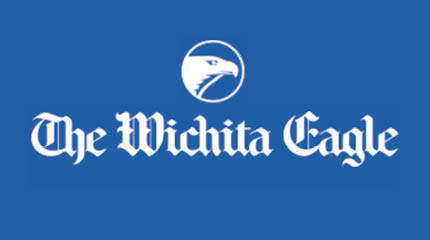Raw milk causes sour feelings in Kansas as sales ban or warning label considered
Got raw milk? The answer in Kansas is yes.
But that could change. A fight over whether dairy producers should be allowed to sell milk straight from a cow — or goat — has reached state legislators after Kansas effectively abandoned a 1967 law last year prohibiting raw milk sellers from advertising outside their farm.
Proposals to either ban the sale of raw milk or require farmers to include warning labels are competing for attention at the Capitol. As legislators consider what approach to take, farmers and consumers are caught in the middle.
“Our consumers of raw milk educate themselves. They’re not stupid people,” said Mary Powell, a Longton resident with more than 30 years of livestock experience.
Milk that is pasteurized undergoes a process that heats the liquid to kill pathogens. By contrast, raw milk is much more likely to carry salmonella, E. coli and other bacteria, according to the Food and Drug Administration.
While Kansas has allowed the sale of raw milk for decades, a growing number of states are loosening restrictions. Forty-three states had some form of legalized raw milk as of 2017, up from 32 in 2004, according to the Association of State and Territorial Health Officials.
Illnesses linked to raw milk are also increasing. The average number of outbreaks from 2007 to 2012 was four times higher than the average number from 1993 to 2006, according to the Centers for Disease Control and Prevention. From 2007 to 2012, the United States experienced 976 cases of illness and 73 hospitalizations related to raw milk.
Powell, who drinks raw milk, said those who seek it out know the risks.
“We find out what is best for us and we consume it,” she said.
But Aaron Pauly, who milks 160 cows on his farm in Sedgwick County, said the bill would stop unregulated sales to uninformed members of the public.
“There’s a certain nostalgia associated with the way our grandparents or even our great-grandparents operated the farms and the food they ate,” Pauly said. But society has progressed “to a higher standard of living.”
Kansas opened a new frontier for raw milk after Attorney General Derek Schmidt and the state Department of Agriculture settled a lawsuit in November over a law that stopped sellers from advertising raw milk anywhere other than on their own farm. Under the settlement, the state agreed to stop enforcing the ban.
Mark and Coraleen Bunner, operators of Shepherd’s Gate Dairy near Pfeifer, filed a lawsuit against the prohibition on Oct. 28. By Nov. 6, Schmidt admitted the law was “plainly unconstitutional.”
“I think it’s notable that now is the very first time this bill is being introduced. And in a way, the timing is somewhat suspect,” said Sam MacRoberts, an attorney with the Kansas Justice Institute who represented the Bunner family.
Raw milk was, and remains, a mostly unregulated enterprise. Sales are restricted to the farm, but there are otherwise few production requirements.
While there are few firm statistics, both sides agree the vast majority of milk production in Kansas occur in the more than 250 registered dairies. Farms that sell only raw milk are not required to register, making it difficult to know how many exist. It’s also difficult to know how many registered dairies also sell raw milk in addition to pasteurized milk.
The Senate Agriculture and Natural Resources Committee spent much of last week hearing from dairy producers. Lawmakers on the panel appear to be leaning against a ban, but it remains unclear how the Legislature as a whole would vote.
“I think that people should have the choice to eat what they want,” said Sen. Marci Francisco, a Lawrence Democrat. “We have a lot of other substances we know are not good for people and we allow those.”
Sen. Dan Kerschen, a Garden Plain Republican who chairs the committee, called an outright ban a “tough sell.”
WARNING LABELS ARE MIDDLE GROUND
Instead, senators have signaled they’re open to greater regulation of raw milk. A bill before the committee would continue to allow raw milk sales but would require warning labels on advertisements and packaging.
Each ad or container of milk would have to say: “This product contains ungraded raw milk that is not pasteurized and, as a result, may contain organisms that cause food-borne illness, especially in infants, young children, older adults, pregnant women and people with weak immune systems.”
The warning could be no smaller than the largest font used elsewhere on the container label or ad.
Powell, speaking to lawmakers during a hearing Thursday, brandished a Hiland Dairy container with the proposed warning taped on and covering the entirety most of its surface.
“Cigarettes have a warning label, but their warning label is much smaller,” Powell said.
Kansas Livestock Association lobbyist Tucker Stewart said labeling requirements are important because of the abandonment of the advertising ban. Raw milk can now be advertised to more consumers than before, he said.
“You might not be targeting those consumers who really understand the dangers of raw milk,” Stewart said.
The Kansas Department of Agriculture is supporting the labeling bill. The agency’s chief counsel, Kenneth Titus, said its goal is to provide information to the public without upending the way raw milk is handled.
“We’re not interested in banning the sale of raw milk. We’re not interested in adding another layer of regulatory process and inspections on these producers that don’t exist now,” Titus said. “But we want to make sure the public is able to make an informed choice.”
Read more here: https://www.kansas.com/news/politics-government/article240314916.html#storylink=cpy

